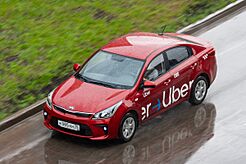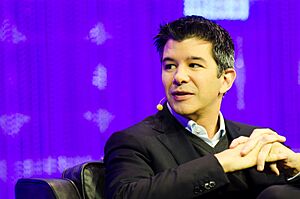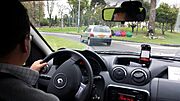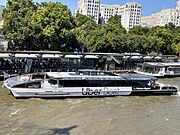Uber facts for kids
 |
|
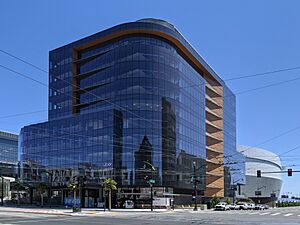
Headquarters in Mission Bay, San Francisco
|
|
|
Formerly
|
Ubercab (2009–2011) |
|---|---|
| Public | |
| Traded as |
|
| Industry | |
| Founded | March 2009 |
| Founders |
|
| Headquarters | San Francisco, California, U.S. |
|
Area served
|
70 countries and 10,500 cities worldwide |
|
Key people
|
|
| Services |
|
| Revenue | |
|
Operating income
|
|
| Total assets | |
| Total equity | |
|
Number of employees
|
30,400 (2023) |
| Subsidiaries |
|
Uber Technologies, Inc., commonly referred to as Uber, is an American multinational transportation company that provides ride-hailing services, courier services, food delivery, and freight transport. It is headquartered in San Francisco, California, and operates in approximately 70 countries and 10,500 cities worldwide. It is the largest ridesharing company worldwide with over 150 million monthly active users and 6 million active drivers and couriers. It facilitates an average of 28 million trips per day and has facilitated 47 billion trips since its inception in 2010. In 2023, the company had a take rate (revenue as a percentage of gross bookings) of 28.7% for mobility services and 18.3% for food delivery.
Uber classifies its drivers as gig workers or independent contractors, which has drawn criticism and legal challenges because it allows the company to withhold worker protections that it would have been required to provide to employees. Studies have shown that, especially in cities where it competes with public transport, Uber contributes to traffic congestion, reduces public transport use, has no substantial impact on vehicle ownership, and increases automobile dependency.
History
In 2009, Garrett Camp, a co-founder of StumbleUpon, came up with the idea to create Uber to make it easier and cheaper to procure direct transportation. Camp and Travis Kalanick had spent $800 hiring a private driver on New Year's Eve, which they deemed excessive, and Camp was also inspired by his difficulty in finding a taxi on a snowy night in Paris. The prototype of the mobile app was built by Camp and his friends, Oscar Salazar and Conrad Whelan, with Kalanick as the "mega advisor" to the company.
In February 2010, Ryan Graves became the first Uber employee; he was named chief executive officer (CEO) in May 2010. In December 2010, Kalanick succeeded Graves as CEO and Graves became the chief operating officer.
Following a beta launch in May 2010, Uber's services and mobile app launched publicly in San Francisco in 2011. Originally, the application only allowed users to hail a black luxury car and the price was approximately 1.5 times that of a taxi. In 2011, the company changed its name from UberCab to Uber after complaints from San Francisco taxicab operators.
The company's early hires included a nuclear physicist, a computational neuroscientist, and a machinery expert who worked on predicting arrival times for Uber's cars more accurately than Google APIs. In April 2012, Uber launched a service in Chicago, whereby users were able to request a regular taxi or an Uber driver via its mobile app.
In July 2012, the company introduced UberX, a cheaper option that allowed drivers to use non-luxury vehicles, including their personal vehicles, subject to a background check, insurance, registration, and vehicle standards. By December 2013, the service was operating in 65 cities.
In December 2013, USA Today named Uber its tech company of the year.
In August 2014, Uber launched a shared transport service in the San Francisco Bay Area and launched Uber Eats, a food delivery service.
In August 2016, facing tough competition, Uber sold its operations in China to DiDi in exchange for an 18% stake in DiDi. DiDi agreed to invest $1 billion in Uber. Uber had started operations in China in 2014, under the name 优步 (Yōubù).
In 2016, Uber acquired Ottomotto, a self-driving truck company founded by Anthony Levandowski, for $625 million. Levandowski, previously employed by Waymo, allegedly founded Ottomotto using trade secrets he stole from Waymo. Uber settled a lawsuit regarding the use of such intellectual property and reached a deal to use Waymo's technology for its freight transport operations.
In December 2016, Uber acquired Geometric Intelligence. Geometric Intelligence's 15 person staff formed the initial core of "Uber AI", a division for researching AI technologies and machine learning. Uber AI created multiple open source projects, such as Pyro, Ludwig, and Plato. Uber AI also developed new AI techniques and algorithms, such as the POET algorithm and a sequence of papers on neuroevolution. Uber AI was shut down in May 2020.
In August 2017, Dara Khosrowshahi, the former CEO of Expedia Group, replaced Kalanick as CEO.
In February 2018, Uber combined its operations in Russia, Armenia, Azerbaijan, Belarus, Georgia and Kazakhstan with those of Yandex.Taxi and invested $225 million in the venture. In March 2018, Uber merged its services in Southeast Asia with those of Grab in exchange for a 27.5% ownership stake in Grab.
Between May 2018 and November 2018, Uber offered Uber Rent powered by Getaround, a peer-to-peer carsharing service available to some users in San Francisco.
In November 2018, Uber became a gold member of the Linux Foundation.
In 2018, Uber formed a partnership with Autzu, a Toronto-based ridesharing company. This collaboration provides Uber drivers with the opportunity to rent electric Tesla on an hourly basis.
On May 10, 2019, Uber became a public company via an initial public offering.
In the summer of 2019, Uber announced layoffs of 8% of its staff and eliminated the position of COO Barney Harford.
In October 2019, Uber acquired 53% of Cornershop, a provider of grocery delivery services primarily in Latin America. In June 2021, it acquired the remaining 47% interest in Cornershop for 29 million shares of Uber.
Between October 2019 and May 2020, Uber offered Uber Works, a mobile app connecting workers who wanted temporary jobs with businesses in Chicago and Miami.
In January 2020, Uber acquired Careem for $3.1 billion and sold its Indian Uber Eats operations to Zomato.
Also in January 2020, Uber tested a feature that enabled drivers at the Santa Barbara, Sacramento, and Palm Springs airports to set fares based on a multiple of Uber's rates.
In May 2020, during the COVID-19 pandemic, Uber announced layoffs of over 14% of its workforce.
In June 2020, in its first software as a service partnership, Uber announced that it would manage the on-demand high-occupancy vehicle fleet for Marin Transit, a public bus agency in Marin County, California.
In September 2020, Uber committed to carbon neutrality globally by 2040, and required that, by 2030, in most countries, rides must be offered exclusively in electric vehicles.
In December 2020, Uber acquired Postmates for $2.65 billion.
Also in December 2020, Uber sold its Elevate division, which was developing short flights using VTOL aircraft, to Joby Aviation.
In January 2021, Uber Advanced Technologies Group (ATG), a joint venture minority-owned by SoftBank Vision Fund, Toyota, and Denso that was developing self-driving cars, was sold to Aurora Innovation for $4 billion in equity and Uber invested $400 million into Aurora.
In March 2021, the company moved to a new headquarters on Third Street in Mission Bay, San Francisco, consisting of several 6- and 11-story buildings connected by bridges and walkways.
On January 20, 2022, Uber acquired Australian car-sharing company Car Next Door.
On September 15, 2022, Uber discovered a security breach of its internal network by a hacker that utilized social engineering to obtain an employee's credentials and gain access to the company's VPN and intranet. The company said that no sensitive data had been compromised.
Finances
| Year | Revenue | Net income |
|---|---|---|
| 2023 | 37.3 | 1.887 |
| 2022 | 31.8 | −9.1 |
| 2021 | 17.4 | −0.4 |
| 2020 | 11.1 | −6.7 |
| 2019 | 14.1 | −8.5 |
| 2018 | 11.3 | 1 |
| 2017 | 7.9 | −4 |
| 2016 | 5 | −3.6 |
| 2015 | 1.7 | −1.6 |
| 2014 | 0.4 | −0.7 |
Uber has posted hundreds of millions or billions of dollars in losses each year from 2014 until 2022 except for 2018, when it exited from the markets in Russia, China, and Southeast Asia in exchange for stakes in rival businesses. By the end of 2022, Uber had US$32.11 billion in assets and $24.03 billion in liabilities. Uber posted annual operating profits in 2023, totaling $1.88 billion, after accumulating $31.5 billion in operating losses since 2014.
Gallery
See also
 In Spanish: Uber para niños
In Spanish: Uber para niños


